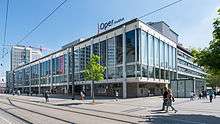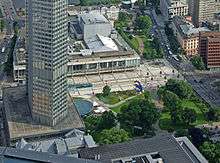Opern- und Schauspielhaus Frankfurt




Opern- und Schauspielhaus Frankfurt is the official name of the opera and drama theatres in Frankfurt am Main. The Oper Frankfurt (Frankfurt Opera) is one of the leading opera houses in Europe, and voted best "Opera house of the year" several times since 2003. The present opera- and playhouse was built after World War II, because the historical building was destroyed. The former house was reconstructed as the Alte Oper and serves as a concert hall today.
History
Frankfurt's first opera was Johann Theile's Adam und Eva, performed in 1698 by Johann Velten's touring company. The young Goethe's first operas in his home town of Frankfurt were productions by Theobold Marchand's company.[1]
1918-1944
During the 1920s the opera in Frankfurt had more prominent Jewish singers than any other company in Germany, including the tenor Hermann Schramm, bass Hans Erl (the first King in Schreker's Der Schatzgräber), baritone Richard Breitenfeld and contralto Magda Spiegel, who also toured with Frankfurt Opera performing Wagner in the Netherlands. These singers were forced to leave the opera in June 1933, though the opera's director Hans Meissner was able to persuade the mayor to speak up for Schramm, who had a non-Jewish wife. Other Jewish members of the opera company among those rounded up at 9 November 1938 at the Festhalle Frankfurt, where Erl sang In diesen Heilgen Hallen, from the Magic Flute for the deportees. Members of Frankfurt Opera were sent to Auschwitz and other camps where they perished. Schramm survived, living to testify against the Frankfurt Gestapo officer Heinrich Baab in 1951.
1945 - 1970s
The opera house was damaged in an air raid in January 1944, and then almost completely destroyed in March. After the war money was tight.[2] A new house for opera and play was built, completed in 1962.
The Gielen Era
From 1978 to 1988 Frankfurt Opera was led by Michael Gielen.[3] This decade became known as the "Gielen Era",[4] notable for the music of a conductor who was also a composer, and directors including Ruth Berghaus and Hans Neuenfels, whose productions of standard works such as Verdi's Aida or Wagner's Ring Cycle were thought-provoking. Operas which received their world premieres at the house were also performed again, including Franz Schreker's Die Gezeichneten.[4]
1989 to date
Many famous singers started their career with the company, including Franz Völker, Edda Moser, Cheryl Studer and Diana Damrau), and many established artists have been engaged there in recent seasons including Christian Gerhaher, whose roles here have included Monteverdi's L'Orfeo and his first Wolfram in Tannhäuser, Piotr Beczała in Massenet's Werther and Jan-Hendrik Rootering in Wagner's Parsifal.
Music Director, since 2008, is Sebastian Weigle, General Manager, since 2002, Bernd Loebe. Weigle's new productions there have included Strauss' Die Frau ohne Schatten, Daphne and Arabella, Korngold's Die tote Stadt, Reimann's Lear and Die Fledermaus by Johann Strauß. He has also conducted performances of Mozart's Die Zauberflöte, Beethoven's Fidelio, Wagner's Tristan und Isolde and Parsifal for the company.[5] He performed the four parts of Wagner's Der Ring des Nibelungen, staged by Vera Nemirova, finishing with Götterdämmerung in 2012.[6] The complete cycle was performed twice in 2012.[7]
In 2017, Debussy's cantata La Damoiselle élue and Honegger's dramatic oratorio Jeanne d'Arc au bûcher were combined, staged by Àlex Ollé, conducted by Marc Soustrot, and co-produced with the Teatro Real Madrid.[8]
Impresarios
Opera
The first conductors had the title Kapellmeister. From 1924 it was Generalmusikdirektor (GMD, General Music Director), who often also held the administrative leadership Intendant (Int.).
|
|
Theatre
|
|
Premieres
Premieres at the Frankfurt Opera have included:
| Date | Opera | Composer |
|---|---|---|
| 16 September 1810 | Silvana | Carl Maria von Weber |
| 4 April 1819 | Zemire und Azor | Louis Spohr |
| 20 January 1851 | Die Opernprobe | Albert Lortzing |
| 26 November 1853 | Rübezahl | Friedrich von Flotow |
| 8 Dezember 1881 | Das Käthchen von Heilbronn | Carl Martin Reinthaler |
| 12 November 1902 | Dornröschen | Engelbert Humperdinck |
| 18 August 1912 | Der ferne Klang | Franz Schreker |
| 15 March 1913 | Das Spielwerk und die Prinzessin | Franz Schreker |
| 25 April 1918 | Die Gezeichneten | Franz Schreker |
| 21 October 1919 | Fennimore und Gerda | Frederick Delius |
| 21 Januar 1920 | Der Schatzgräber | Franz Schreker |
| 1 July 1920 | Die ersten Menschen | Rudi Stephan |
| 26 March 1922 | Sancta Susanna | Paul Hindemith |
| 9 July 1924 | Der Sprung über den Schatten | Ernst Krenek |
| 8 November 1924 | Sakahra | Simon Bucharoff |
| 25 February 1926 | Die zehn Küsse | Bernhard Sekles |
| 14 November 1926 | Der Golem | Eugen d’Albert |
| 25 December 1926 | Die Lästerschule | Paul von Klenau |
| 1 February 1930 | Von heute auf morgen | Arnold Schönberg |
| 23 March 1930 | Achtung, Aufnahme!! | Wilhelm Grosz |
| 25 May 1930 | Transatlantic | George Antheil |
| 31 January 1934 | Prinz Eugen der edle Ritter | Max Pflugmacher |
| 22 May 1935 | Die Zaubergeige | Werner Egk |
| 26 May 1936 | Doktor Johannes Faust | Hermann Reutter |
| 8 June 1937 | Carmina Burana | Carl Orff |
| 13 January 1942 | Columbus | Werner Egk |
| 7 September 1942 | Odysseus | Hermann Reutter |
| 20 February 1943 | Die Kluge | Carl Orff |
| 1 March 1962 | Die Alkestiade | Louise Talma |
| 1964 | Dame Kobold | Gerhard Wimberger |
| 1986 | Die Reise zum Mittelpunkt der Erde | Hans-Joachim Hespos |
| 15 June 1986 | Stephen Climax | Hans Zender |
| 12 December 1987 | Europeras 1 & 2 | John Cage |
| 18 May 1989 | What Where | Heinz Holliger |
| 14 June 2002 | Dr. Popels fiese Falle | Moritz Eggert |
| 7 Oktober 2006 | Caligula | Detlev Glanert |
| 14. September 2014 | Sirenen – Bilder des Begehrens und des Vernichtens | Rolf Riehm |
References
- ↑ F. M. Stockdale, M. R. Dreyer The Opera Guide 1990 342
- ↑ Die Frankfurter "Alte Oper": Baumonographie eines Opernhauses Christiane Wolf Di Cecca - 1997 p225 "Das Frankfurter Opernhaus erfährt am 29. Januar 1944 durch einen Luftangriff zunächst eine leichte, schließlich in der Nacht zum 23. März 1944 eine schwere Beschädigung. Nach dem Krieg fehlt vor allem zunächst das Geld für Abriß und ..."
- ↑ Richard Wagner, Fritz Lang, and the Nibelungen ix David J. Levin - 1999 "For a decade, 1978 to 1988, Frankfurt Opera under Michael Gielen was such a place. ' He hired some of the most interesting and innovative production teams — stage directors as well as set and costume designers ..."
- 1 2 Roth, Wilhelm (20 July 2017). "Dirigent, der in Frankfurt einst eine Ära begründete, wird 90 Jahre alt: Unermüdlich trieb Michael Gielen die Moderne voran". Frankfurter Neue Presse (in German). Retrieved 20 July 2017.
- ↑ "Sebastian Weigle". Frankfurt Opera. Retrieved 7 March 2012.
- ↑ Friedeon Rosén (29 January 2012). "Frankfurt: Götterdämmerung – Premiere" (in German). der-neue-merker.eu. Retrieved 7 March 2012.
- ↑ "Der Ring des Nibelungen Cycle 1". oper-frankfurt.de. Retrieved 5 March 2012.
- ↑ Jungheinrich, Hans-Klaus (12 June 2017). "Frauen gen Himmel / Honeggers spektakuläre "Jeanne" mit dem Debussy-Prolog "La Damoiselle élue" an der Oper Frankfurt" (in German). Frankfurter Rundschau. Retrieved 20 June 2017.
External links
- Städtische Bühnen Frankfurt am Main GmbH (in German)
- Welcome to Oper Frankfurt
- Theatre Frankfurt
- The Forsythe Company
- Frankfurt Baut Auf: Website on Frankfurt Post-war Reconstruction: Theatre history (in German)
- Frankfurt Baut Auf: Website on Frankfurt Post-war Reconstruction: Opera house rebuilding (in German)
- Stuart Skelton, Heldentenor - Opera~Opera article 2006
Coordinates: 50°06′29″N 8°40′27″E / 50.10806°N 8.67417°E